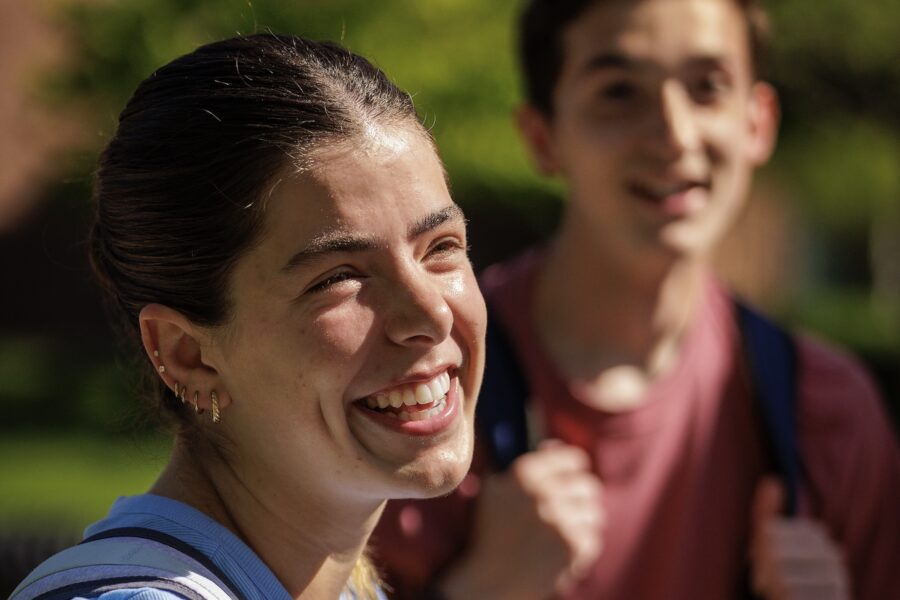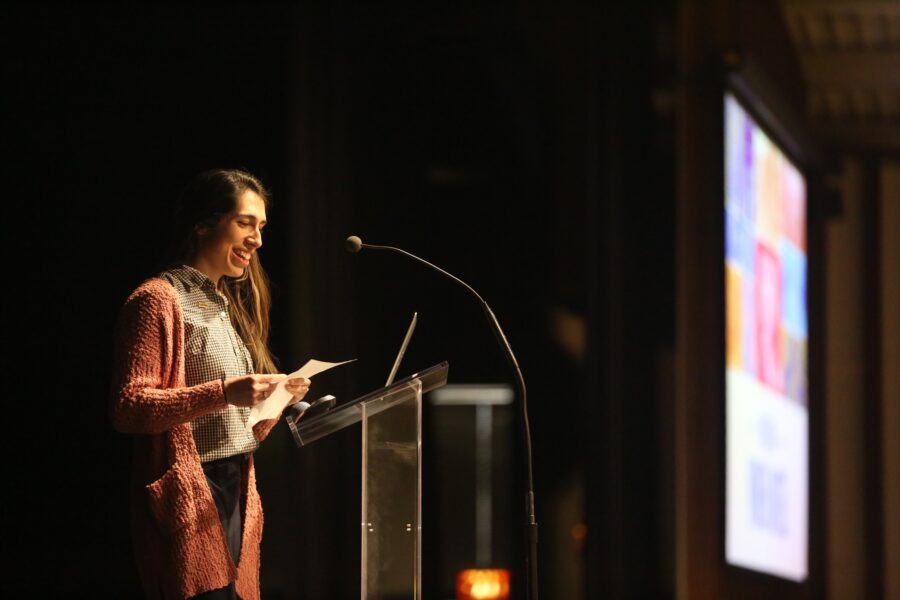
Does the secret fade // Or is it everlasting?
One might say that the secret to living well has less to do with the length of time on earth and more to do with the people who intersect one’s journey. Such is the premise of the musical Tuck Everlasting, presented on the stage of Kresge Auditorium by ONU Theatre and the School of Music, February 20-22, 2025.
Adapted from the best-selling children’s novel by Natalie Babbitt, Tuck Everlasting unpacks the complexities of what it would mean to live forever through the perspective of the young protagonist, Winnie Foster. The ambitious 11-year-old finds her life unexpectedly intertwined with the Tuck family, who have unearthed the secret to everlasting life. In addition to considering whether she will join the Tucks on their journey of unending youth, Winnie must fight to protect their secret from people who want to exploit the chance to live forever.
Tuck Everlasting is directed by instructor and ONU Theatre director, Kelsie Davis ’19/’22 MBA, but almost every other element of the production—from lighting and set design to handling props and costuming the cast—is handled by a team of talented Olivet students.
“One of the most interesting parts of this production process is that this is really the first production we’ve had with an almost-complete production team; which means that not only are students the ones performing, but they are also filling behind-the-scenes leadership roles,” said Professor Davis. “This is exciting because we’re getting really close to operating like a professional theatre company would. Many of the students have their sights set on technical theatre careers, so it’s been exciting to see them become very committed to these roles.”
The family-friendly musical features a large cast and crew of Olivet students, demonstrating that the secret to a great show is dynamic teamwork.
“Theater, by design, is a group effort,” said freshman Jacob Schindler (Angus Tuck), who is double majoring in multimedia communications and theatre production and performance. “The ensemble makes the show—and ensemble doesn’t necessarily mean ‘backup dancers.’ The ensemble is the whole cast and the whole crew. Acting is reacting—I take what I’m given by the ensemble, and I give it back to them.”
A live performance offers a dynamic mode of storytelling that puts the actors’ talents on display in real time and requires that the crew be equally consistent in their tasks. On any given show day, the audience should be able to sit back and enjoy the narrative arcs that are displayed through the actors and amplified by creative staging, costuming, musical cues, hair, makeup, prop handling, choreography, etc.
Junior Marina Prather, who is majoring in theatre production and performance with a minor in musical theatre, is the stage manager for Tuck Everlasting and oversees the backstage operations.
“No two theatre performances are exactly the same,” Marina said. “There are always different factors: different elements, different actors, and a different audience (which can largely communicate to the cast or give no emotion). Things can go wrong and there is a beauty in impromptu adjustments.”
The thrill of that variation in each performance is part of what attracts people to be part of a stage production—particularly for the impact a show can leave on its audience.
“Live theatre is important because it brings people together to experience stories in a real, emotional way that can’t be replicated on a screen,” said junior Cooper Skoumal (Miles Tuck), who is majoring in music. “Tuck Everlasting is especially important because the show makes audiences think about the value of life and the beauty of both its joys and struggles.”
All live theatre performances ask the audience to temporarily suspend their disbelief to enter a different world. The consistent collaboration between the ensemble on stage and those doing behind-the-scenes work is crucial for audiences to fully embrace the elements of the show that push beyond their own grounded reality.
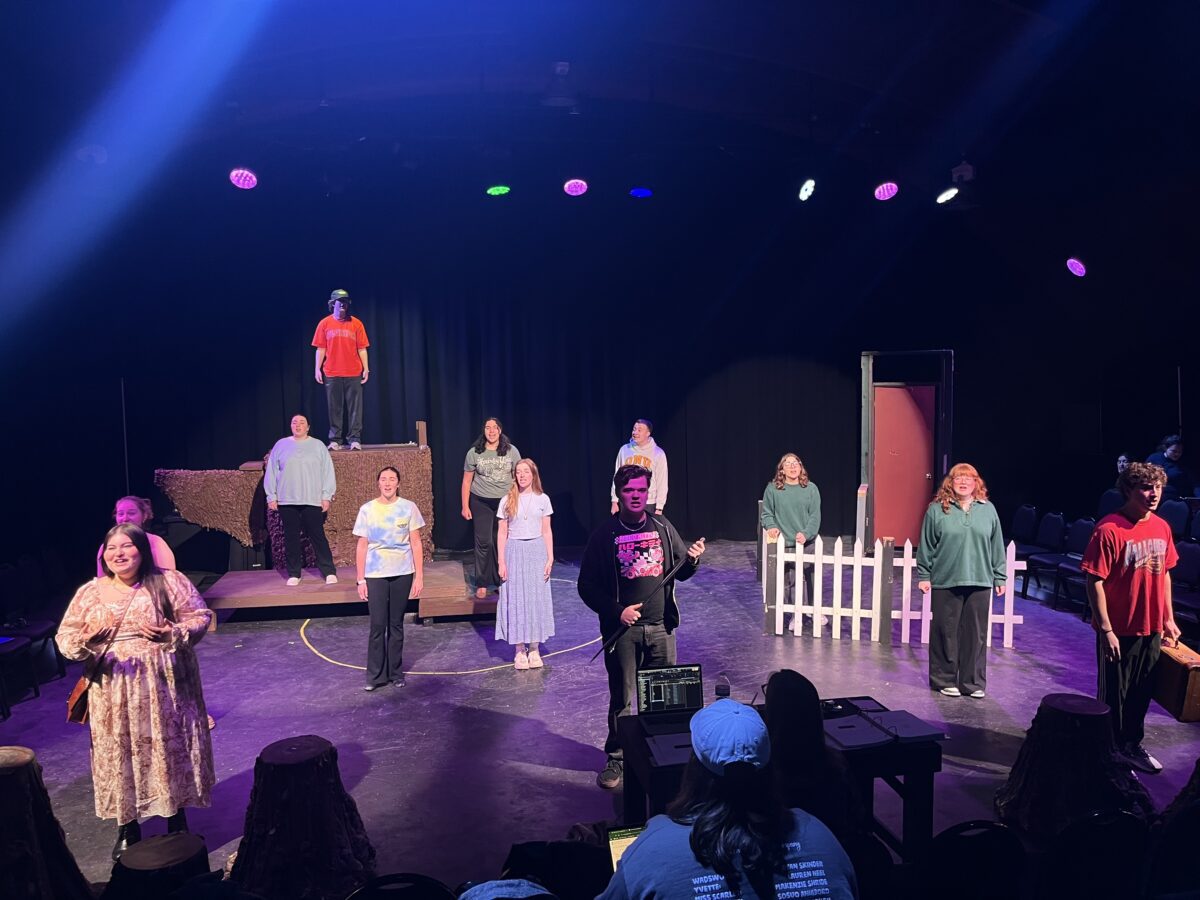
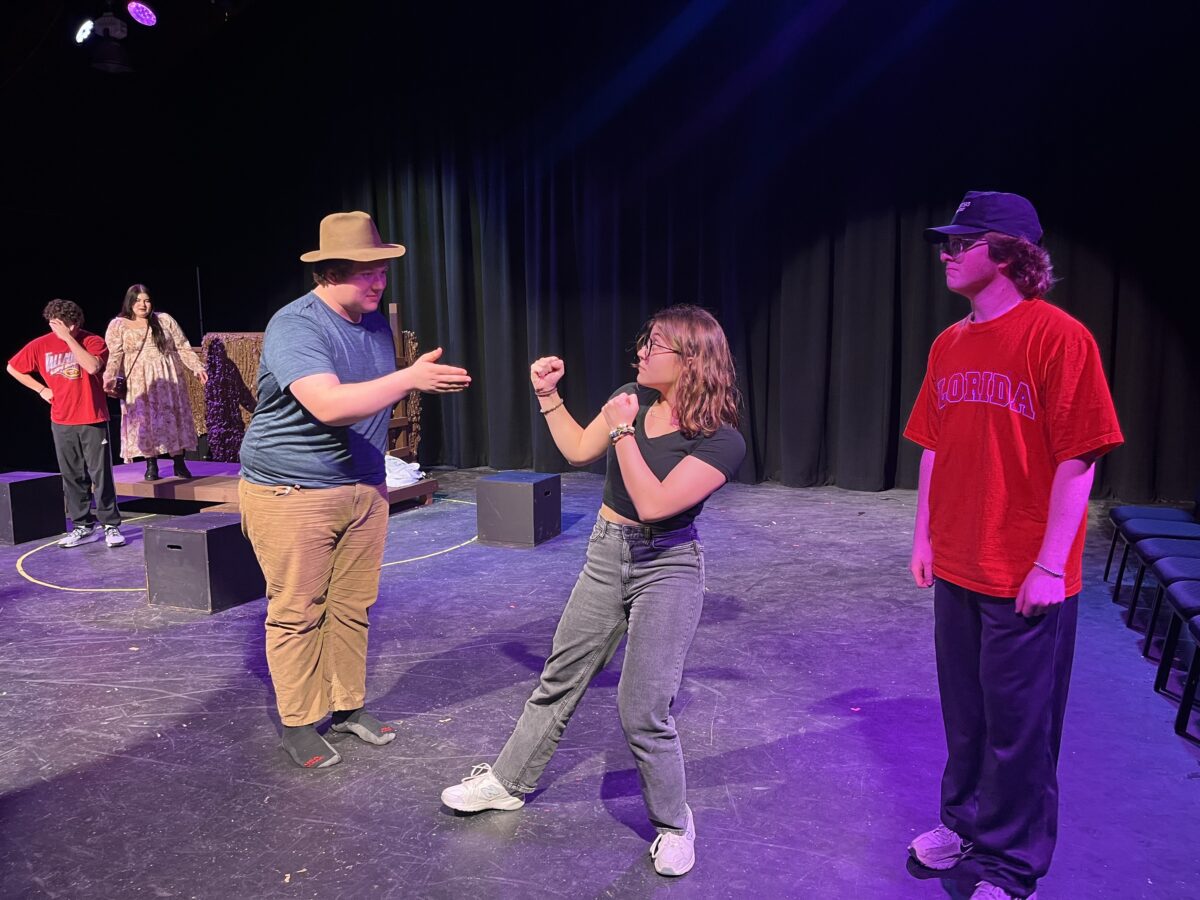
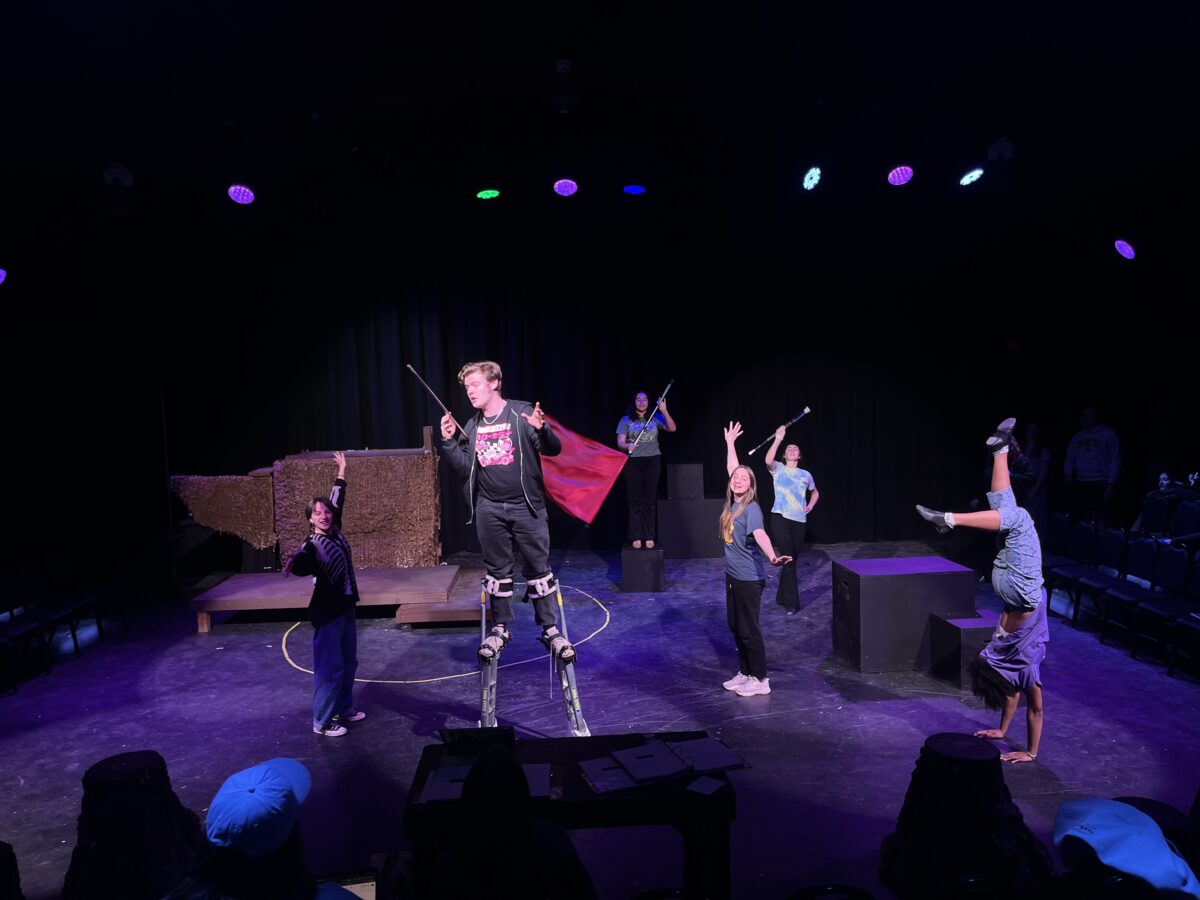
For example, Ash Cook (Winnie Foster), a sophomore majoring in elementary education with a minor in psychology and endorsements in social science and music, had to figure out how to embody a character she can’t directly relate to. For her ONU Theatre debut, Ash pulled inspiration from a unique personal source—her own 11-year-old sister.
“Something that’s been challenging about bringing [Winnie] to life has been figuring out the physicality of her character and the way she moves,” Ash reflected. “I’m thankful to be a part of such a supportive community where I can figure her out as we rehearse and as I practice on my own!”
With the help of Prof. Davis and the choreographer, Grace Beatty, a senior biology major with minors in chemistry and history, Ash fleshed out the character of Winnie in order to realistically portray the character’s youthful ambition and sense of wonder.
“It is essential that the actors move in a way that aligns with their character and that the movement feels genuine,” Grace explained. “Dance gives an extra layer of storytelling by being able to physically show transitions and emotions on stage, along with the dialogue and songs.”
This kind of integral connection between the cast and crew has been essential for developing engaging storytelling. Sound designer Ryan Skinder, a senior who is majoring in theatre production and performance, with a minor in literature, views his job as creatively filling the gaps left between the music and the actors’ performances with things like fake gunshot sounds or animal noises.
“Just as the Tucks have to come together to solve their issue of being potentially discovered, we as a production team came together to solve a single but complex issue: how to bring this show to life,” Ryan reflected. “Actors work tirelessly to bring the characters to life, but it is up to us to bring the rest of the world around them into reality for both them and our audience.”
In a similar vein, set designer Jessy Ann Stream, who is a junior majoring in youth ministry with a minor in theatre production and performance, explained that the plot-setting devices like an on-stage tree, a white picket fence, or the spring that provides the Tuck family with everlasting life give the audience context for pivotal moments of conflict and resolution to occur.
“I really wanted that magical spring to be the center piece for this show,” Jessy Ann said. “I was very fortunate that Dr. Woodruff [conductor of the pit orchestra] allowed me to decorate his pit to bring the spring to life and add depth to the performances.”
Senior accounting major Ana Quezada (Mae Tuck), further explained, “The production team are the ones behind the scenes, ensuring that every scene transition is smooth, the lighting and sound are on point, and that special effects happen without a hitch.”
“Imagine if, after each scene, the actors had to stop, break character, and move set pieces around—it would completely disrupt the magic of the experience,” Ana continued. “Instead, the production team quietly makes all those shifts happen, allowing us to stay fully immersed in the world of the play.”
Ultimately, the overarching goal of a performance is to combine all of these creative elements so that audiences can connect with a story in a meaningful way to impact their lives when they leave the theatre.
“The story of Tuck Everlasting is so important because it explores themes of life, death and the choices that we make,” said assistant director, Katie DeVries, who is a junior double-majoring in theatre production & performance and film studies. “When Winnie meets the Tucks, she immediately wants to join them in their immortality. But, they help her realize that she doesn’t need to live forever, she just needs to live her life to the fullest. You only get one life; enjoy every second and don’t take any of it for granted.”
ONU Theatre and the School of Music present Tuck Everlasting, on Thursday, Feb. 20, at 7:00 p.m.; Friday, Feb. 21, at 7:00 p.m.; and Saturday, Feb. 22 at 2:00 p.m. and 7:00 p.m. Tickets are available at Olivet.edu/events.



